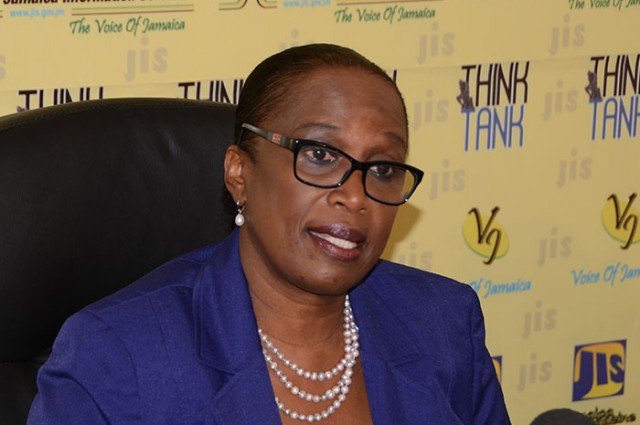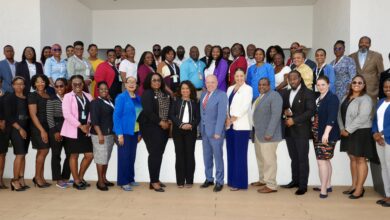A sexual and reproductive health information programme, to teach parents how to talk to their children about sex, is among several strategies proposed by the United Nations Population Fund (UNFPA) in addressing adolescent pregnancy.
The strategy is one of five elements outlined in a CARICOM/UNFPA Integrated Strategic Framework, aimed at reducing the number of adolescent pregnancies in each country of the English and Dutch speaking Caribbean, by at least 20 percent by the year 2019.
“We all learn to do most things. One of the things we do not learn is to be a parent, and especially when being a parent is not your choice. Sometimes talking about sex is like a taboo for some parents. They do not know how to do it and it is easily not done,” Director of the UNFPA Sub-Regional Office for the Caribbean, Sheila Roseau said.
She was speaking at a recent Jamaica Information Service Think Tank, held at the agency’s head office.
The UNFPA has embarked on a public education campaign aimed at highlighting elements of the Framework for implementation and reducing adolescent pregnancy in the Caribbean.
“We have been working with our partners. It is a multi-sectoral approach. It is not for one agency to be doing and it involves everyone, the schools, communities, churches, parents, adolescents, everybody,” she said.
Ms Roseau stated that the Framework was developed when the Council for Human and Social Development for CARICOM “recognised the high prevalence rate of adolescent pregnancy in the region.”
“UNFPA serves English and Dutch speaking Caribbean and in the Caribbean region, 20 percent of women have had at least one child by the age of 19 years,” she said, adding that a considerable percentage of adolescent girls become pregnant before the age of 15 years.
She said the matter of adolescent pregnancy was addressed by CARICOM Member States at a Caribbean Cooperation in Health meeting held in 2011 when it was agreed that something be done about it.
After several consultations, she said a draft Framework was presented and approved at a High Level Meeting with dignitaries of Caribbean countries in December 2013.
Another component of the Framework being proposed is for all adolescents to have access to age appropriate accurate information, as well as quality sexual and reproductive health services, information and commodities.
“It is expected that we would strengthen and increase the availability of differentiated youth-friendly non-judgmental and free from discrimination sexual and reproductive health services for adolescents,” Miss Roseau said, adding that services should be “available, accessible, acceptable, appropriate, equitable and effective.”
She further noted that family life education is part of the school curricula implemented in most schools in the Caribbean. However, she said the UNFPA is working with CARICOM to strengthen the capacity of educators to deliver family life education.
The UNFPA is also working to have all governments implement social protection mechanisms for the prevention of all forms of violence against adolescent girls and boys, especially the poorest and most marginalized.
Ms Roseau said special attention would be paid in monitoring domestic violence, sexual violence, peer pressure bullying, drug and substance abuse and mental health issues.
“So we would have to strengthen the social support systems that are in place and put in place other mechanisms for adolescents who are at risks of sexual violence and adolescent pregnancy and respond to their needs,” she said.
The Framework also refers to the role of the church and communities in preventing adolescent pregnancies.
Ms Roseau emphasised the need for community and faith-based organisations to promote and facilitate activities such as parenting programmes, support groups and promote safe spaces for social interaction.
Another part of the Strategic Framework is the adoption of legal standards concerning ages of marriage, consent, prosecution of perpetrators of sexual violence and access to social protection and sexual and reproductive health services.
“We will develop model legislation in the Caribbean that will regulate the minimum age of consent for sexual intercourse, marriage, and access for contraceptives, including emergency contraceptive and other sexual and reproductive health services according to International standards,” she said.
She said the process has started in Barbados and the Organisation of Eastern Caribbean States (OECS) where a Legal Gap Analysis was conducted.
“Concluding from that legal gap analysis was found that the age for sexual consent varies across the Caribbean,” Ms Roseau said, adding that in most countries, the age of sexual consent is 16 years and in St Vincent and the Grenadine it is 15 years.
“So this Framework is calling for the harmonization of the age of consent,” she added.
Miss Roseau said the Framework is also calling for the exchange of knowledge, information and good practices among governments in the English, French and Dutch speaking Caribbean in addressing adolescent pregnancy.
She added the UNFPA will continue to ensure that information on good practices on adolescent pregnancy in widely available.
by Elaine Hartman Reckord






